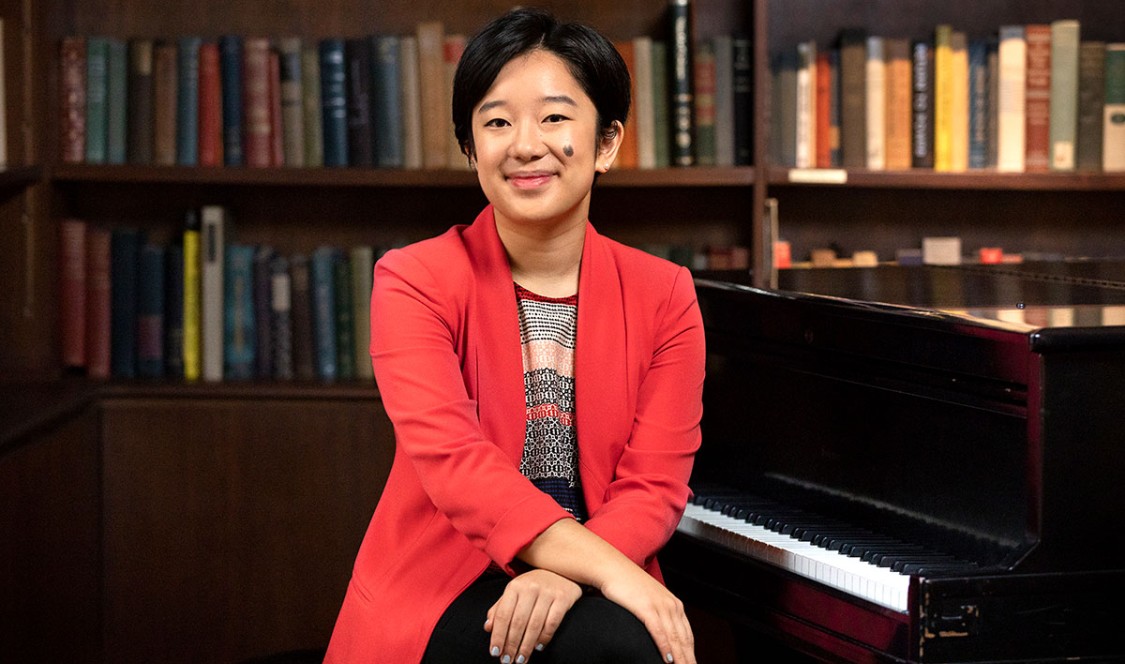Why CMC: “I really wanted to become a lawyer, and I dreamed of eventually applying to law school. CMC had a lot of strong opportunities for me to pursue that path in the government major. Since I’ve been here, one of my favorite classes has been with Professor Pitney. His government course helped me meet a lot of like-minded peers who really enjoyed learning about politics. It was great to find that community right away, which eventually led me to the Rose Institute.”
Dual passions: “I didn’t consider music or music history at all when I decided on CMC. But a music history class at Scripps opened up the possibilities for what else I could try here. I love classical music and the histories behind classical musicians. There are so many fascinating stories—the lives of Frederic Chopin or Clara Schumann, for example—and the personal dynamics that fuel their passions. I come from an extended family of journalists, so I guess it’s second nature to look for the narrative.
- Melia Wong ’19
- Hometown: Seattle
- Majors: Government and music
- Activities: Resident assistant at Phillips Hall; communications manager at Rose Institute of State and Local Government; co-founder of Claremont Government Society; music theory tutor at local nonprofit Uncommon Good
“Really, it ended up being CMC’s government major that challenged me to think critically about music and become more motivated to ask critical questions. What do I need to know about music history and the stereotypes within that field? Who is funding music? How are people receiving this music? I started to look at all of these narratives, and the personal side of classical music history, with a more political lens.”
End note: “I am writing my senior thesis on Civil War songs as a government and music dual thesis. There are a couple of chapters focusing on political theory, and now I’m shifting the focus to musical analysis. I’m looking at songs that were used by both Northern and Southern troops, as well as civilians, with a focus on critically analyzing lyrics—the interpretation of words like liberty, freedom, and equality and what they meant to each side. It is a very unusual topic in some respects. I don’t think there has been a government and music combined thesis in the past four years. I’m excited to see where it will go.”
Real experience: “My interests and career path have really been honed by summer internships. I’ve been so lucky to be sponsored by CMC for all of them. My first-year summer, as an Appel fellow, I had the opportunity to travel to Glasgow, Scotland, to work with a well-known music nonprofit called El Sistema. My service involved working with immigrant children. I learned about different cultural norms and how to deliver music to underserved communities.
“During my sophomore year, I went to D.C. and interned with the Millennial outreach arm of the Center for American Progress, which is one of the largest Democratic think tanks. I really felt supported by the political pulse of D.C. in all the work that I did there. We texted voters in key swing states and honed in on younger people who were interested in becoming politically active. Finally, last summer, I worked for a Scripps alumna who teaches musicology. That was a wildly engaging experience, as we looked at a sector of music called graphic notation and started collecting data for her latest publication. All were very different experiences, but they taught me to challenge norms and figure out how to pair government with music naturally.”
Memorable moment: “Being an RA at CMC has meant a lot to me. It’s been so exciting to know that I can play some small role in shaping the lives of our campus community. For me, Phillips Hall represents the heartbeat of campus—we call each other the Phillips Phamily. Everyone is super tight knit and supportive of one another. When I received the email that I was going to be an RA in Phillips, it was like getting into CMC all over again.”
Future: “I was recently accepted to be a Luce Scholar with the Henry Luce Foundation. I will be traveling to Asia for a year, working with a music foundation. I’ll find out more in April, but I would eventually love to work for a symphony or orchestra in marketing, outreach, and education—basically any organization that will let me write and talk about classical music for the rest of my life.”
On leaving: “Part of the reason I came to CMC, and why I have been so happy, is because of the community. There is such institutional dedication to the success of students here. You see it when alumni come back to teach and speak on panels. They really devote the rest of their lives to giving back. Also, when you’re a small school, so much depends on making personal relationships, and I’m grateful to have learned from my CMC peers. There has been a lot of trial and error for me here. But they’ve always helped me recognize the positive impacts of challenging situations—even when those good parts weren’t initially visible.”
—Alicia Reynaga ’22

